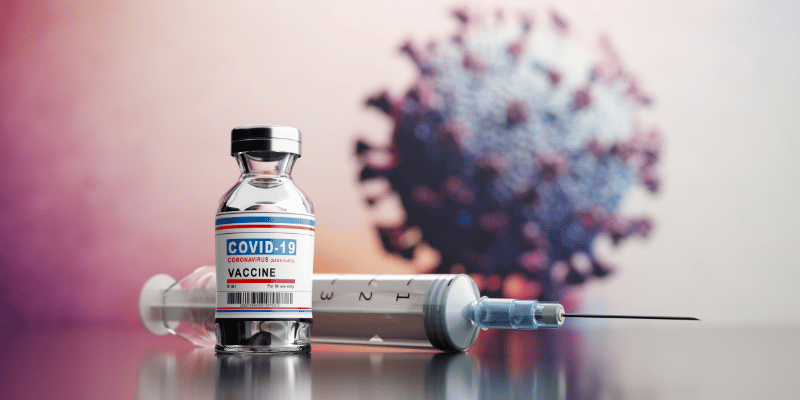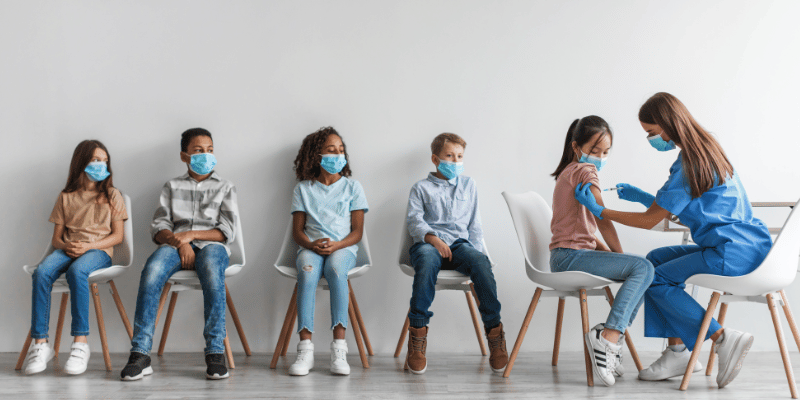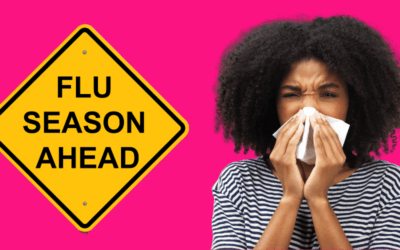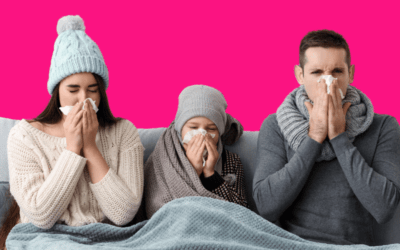I have worked in nurse-led vaccination clinics, without a doctor on site, vaccinating clients as young as new-borns for many years. The nearest staff doctor was about 300 miles away at any given time. Is this ‘a bit dodgy’? Absolutely not.
However, it’s surprising how many nurses ask me this question during immunisation training sessions. So, it’s clearly time for a blog about it.
Let’s start with the very core of the nursing profession:
The Nursing and Midwifery Council NMC Code
Registered nurses are accountable, responsible professionals. They work following a strict code of conduct, and are able to work without a doctor on site in many areas. This includes vaccination clinics. Non-registrants are another matter. They CANNOT work in a vaccination clinic without a registrant on site. This can sometimes be the root of some confusion. This, however, doesn’t have to be a doctor. Registered nurses can supervise and support non-registrants such as Health Care Assistants (HCAs), for example. The Royal College of Nursing (RCN) provides some useful resources in this area.
But what about legal tasks like prescribing if the nurse is not a prescriber?

Nurses can be prescribers of course. But vaccination clinics are often reliant on Patient Group Directions (PGDs), Patient Specific Directions (PSDs), national protocols, or written orders as the legal mechanism for administering the medicines without being a prescriber. What nurses are NOT able to do by themselves (if not a prescriber) is administer vaccines outside of these legal mechanisms. Therefore, it is useful to have a prescriber (again, not necessarily a doctor) around in case a PSD is required. BUT do they need to be on site? This can be done remotely – our prescriber was just a call away and could send electronic PSDs and offer remote support when required.
But what about other services that only a doctor can do?

Some practices like to incorporate a medical check up by a doctor opportunistically at the same time as a vaccination appointment. This seems like a sensible thing to do. Capturing patients when they attend for something else minimises clinic visits and maximises chances of seeing a patient. But the important thing here in answering the question is that, although convenient, it’s not essential. Nurses can also offer a wide range of medical reviews too if trained to do so.
Let’s also look at the management of adverse events.

We know that giving any medication at all might mean things don’t always go to plan. No-one wants to be the only one on shift when an emergency such as anaphylaxis arises. And whilst the likelihood is very low with vaccinations, anaphylaxis is always something to have in the back of our minds when administering any medication. This is why it’s most certainly a preference to have someone else around to help in an emergency. However, if one does prefer a bit of company for situations like this, it again, doesn’t have to be a doctor, or indeed any other registrant on site.
Unless, of course, you are NOT a nurse or allied health professional. This element, incidentally, is why non-registrants should not be working without someone around who can form a plan of care for an anaphylaxis victim should the worst happen. Another very common question I receive on courses is; “can a HCA run a flu clinic off-site by themselves?”. No. Whilst a HCA might be very competent in administering medications (including adrenaline) and be able to assist in an emergency situation, they should not be put in that potentially incredibly precarious position of being responsible for assessing, managing, and planning life-saving care alone, which is way beyond their job description and responsibilities.
But back to nurses

None of the guidance specifically on immunisation stipulates that doctors have to be knocking around a nurse-led vaccination clinic ‘just in case’. This is because nurses should be trained to be able to deal with emergencies in vaccination clinics and to take required actions. This is why it’s important to be up to date with Basic Life Support (BLS) training at least annually (as recommended by the Resuscitation Council UK and the National Minimum Standards for Immunisers). It’s not just a ‘tick box’ exercise and should be taken very seriously. One never knows when one might just need it.
Incidentally, another blog in the pipeline is about the time I had to perform CPR on an unfortunate party-goer in a nightclub on a night out. I’ve calculated that despite a substantially active social life in my 20’s, I’ve probably spent way more time in vaccination clinics than nightclubs. Yet I have performed more emergency assistance in nightclubs than vaccination clinics. And from this I have concluded that given the ratio of clinic BLS-required situations versus nightclub BLS- required situations, nightclubs have presented themselves as riskier places in my experience. And my point: I don’t usually take a doctor with me on a night out. Although I am starting to think it would be rather helpful.
What about COVID clinics? Are they more risky?

Mass COVID vaccination clinics were well-staffed to have extra support from medical teams with there being new vaccines about, and therefore potentially increased requirements to gain IV access and administer IV emergency drugs and oxygen. This seemed sensible. But again, nurses are able to perform these kinds of procedures, and can make autonomous decisions within protocols if trained. Plus, the emergency drugs used and recommended in immunisation-related anaphylaxis (such as adrenaline) are exempt under the law from having to have a prescription if it’s ‘for the purpose of saving a life’.
Interestingly, on yet another side note, there was a mass observational study undertaken in 2021 looking at a comparison between the anaphylaxis rates of different vaccines. This study found that COVID vaccines only ranked 5th in the overall rates of anaphylaxis after a vaccine. As a result, I still feel that nightclubs are more dangerous places for nurses to be than vaccination clinics.
So, having a doctor on site for life threatening incidents is useful, but not essential. What about other deviations from the norm?
Incidents and deviations are, of course, also something a nurse may have to deal with if working alone. One might feel perfectly able to deal with a standard day to day clinic where nothing goes wrong. But what if there is a cold chain breach? An incorrect administration of a vaccine? A GDPR breach? This useful guidance from the UK Health Security Agency (UKHSA) has been around a while now. It was designed (in part) to help all types of staff make judgments about vaccine errors and decide what to do without necessarily the need for doctor input. The aim was to achieve consistency in response to errors, facilitate decision making around incidents, and also to improve standards in general after all the wastage and drug errors reported. Its very existence implies that nurses and allied professionals are encouraged to make informed independent decisions about adverse situations that occur in practice.
But what if the nurse is rubbish at vaccinating? Should they really be working without a doctor present on site?

Whether one can work professionally and autonomously also depends on competency. They have to be GOOD at vaccinating! Nurses should be adequately trained to perform the role in a vaccination setting, including emergency care. If a nurse doesn’t have the skills to vaccinate properly it doesn’t matter if there’s a hundred doctors in the room. That nurse shouldn’t be vaccinating full stop. See this blog post for an example of the consequences of poor medication management. And again, refer to the NMC code which states: “The professional commitment to work within one’s competence is a key underpinning principle of the Code (section 13, preserve safety) which, given the significance of its impact on public protection, should be upheld at all times.”
Competencies do not just mean ‘having a bit of paper with some signatures on’. Nor does this mean ‘attending a course and having a certificate to prove it’. See our previous blog post about this for more detail on that topic.
However, here are some key competencies and aspects related to immunisation practice. This short list might help guide a decision about whether someone is ‘competent’ or not:
- The RCN immunisation competencies (based on meeting the National Minimum Standards for Immunisers)
- National Institute for Health and Care Excellence (NICE) PGD competencies
- All Mandatory Training required by the area of practice (Safeguarding, GDPR, Chaperoning, BLS, sharps and so on)
And what is the National Minimum Standard (NMS) for immunisation training courses specifically?

Initially, an immunisation course should be at least two days in length (or equivalent if self-directed virtually). It should be based on all the listed competencies. But this doesn’t mean someone comes out of it fully competent. It is just the START of the journey. Adequate supervision and further training and support should be offered as required tailored to the nurse in question. The NMS emphasises the need for follow up supervision and local training alongside any external immunisation course.
What if a nurse is fully trained to the NMS, but still doesn’t feel comfortable without a doctor present on site?
It’s important that the nurse feels competent and is sufficiently trained to work autonomously. This is part of the NMC Code, of course, which talks about not going beyond scope of practice or taking risks with patient safety. It is important to remember that the minimum standards for immunisers are just that. The minimum. So if a nurse doesn’t feel confident after a minimally-recommended two day course, then they should show integrity and simply shouldn’t agree to doing it. What that nurse needs is more training, more supervision, and more support.
Seniority and experience is always a consideration
Junior nurses will likely feel that they require more support than those who have become ‘part of the furniture’ and are already operating in a senior or leadership role at the practice. Everyone is different in levels of experience and willingness to do certain tasks unsupported. The Resuscitation Council UK also recognises this in the context of anaphylaxis management. They comment:
“There is considerable variation and overlap between the skills and knowledge of different healthcare providers who are expected to treat anaphylaxis. Therefore we have deliberately not developed guidelines for specific groups of healthcare providers.”
There is also a big difference between working completely alone, (e.g. visiting a housebound patient visit for an influenza vaccine) or working without a GP, yet within a team of other people (e.g. in a fully booked Influenza clinic staffed by 6 nurses and 3 HCA’s at any given time). The context is an important consideration.
So, what if the local policy says a doctor should be on site at all times?

What a local policy says, and sometimes what the practice insurance stipulates about doctors being on site, may deviate from the general notion of autonomous nursing. So, it’s important to check that too. A nurse might be raring to go it alone but constrained by local insurance, policy, and procedures.
Those whom are directly responsible for ensuring competency of their staff may desire to have an active role too. THEY may not want to leave staff potentially feeling alone and unsupported.
Here’s what the English regulators, the Care Quality Commission (CQC), have to say about primary care supervision.
“Providers must make sure staff are competent and provide appropriate supervision and oversight. A senior member of the clinical primary care team should provide day-to-day supervision of all clinical staff under their direction and control.
Supervision can be:
- Clinic/practice supervision: day-to-day support for issues arising in the practice
- Clinical/professional supervision: regular support to promote high clinical standards and develop professional expertise. This does not always need to be a GP
- Educational supervision: supports learning and enables learners to achieve proficiency.”
Note: The CQC do not stipulate whether the supervision and support has to be in person or remote. They also note specifically that the supervision doesn’t have to be a GP (highlighted in red).
In conclusion

So, the answer to the question of: “Can nurses work in a vaccination setting without a doctor on site?”, can come down to many aspects. For example, the training, willingness, and experience of the nurse. Or contextual factors like the size and skill mix of the wider team, insurance, and local policy. But like with all questions related to: “can I do this…”, it ultimately comes down to a much wider notion:
- An evaluation of what the word ‘professionalism’ means in the context of nursing.
- The nurse’s ability to act safely and in accordance with the Code.
- To not push the boundaries of competence in any circumstance that might put a patient at risk.
These are perhaps the most vital considerations of all when it comes to this question.
Legal and Professional Aspects of Vaccine Administration – FREE Lunchtime Learning

If you enjoyed this blog post and would like to delve further into some of the legal and professional aspects of vaccine administration we are running a FREE Lunchtime Health News Session on Friday 2nd February 2024 between 12:30-13:30pm. Save the date and sign up now.




